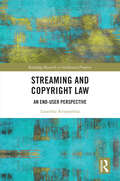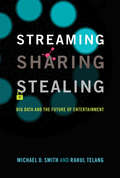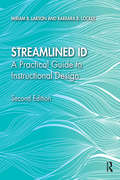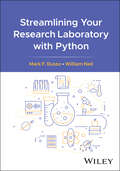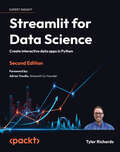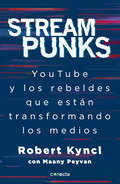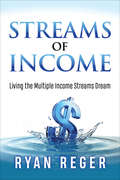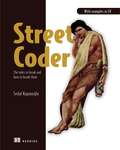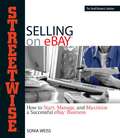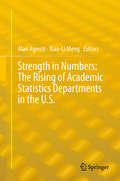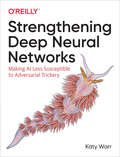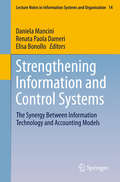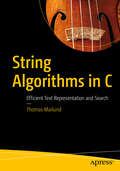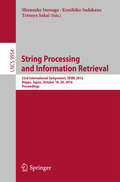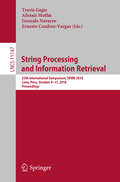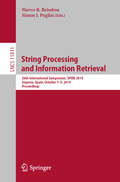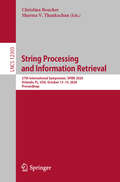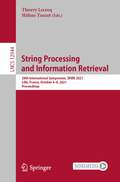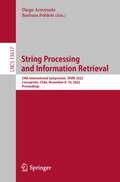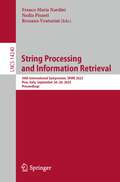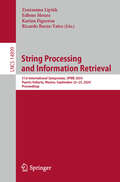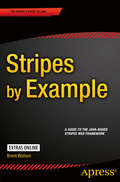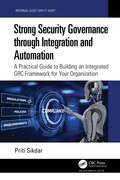- Table View
- List View
Streaming and Copyright Law: An end-user perspective (Routledge Research in Intellectual Property)
by Lasantha AriyarathnaThis book examines the challenges posed to Australian copyright law by streaming, from the end-user perspective. It compares the Australian position with the European Union and United States to draw lessons from them, regarding how they have dealt with streaming and copyright. By critically examining the technological functionality of streaming and the failure of copyright enforcement against the masses, it argues for strengthening end-user rights. The rising popularity of streaming has resulted in a revolutionary change to how digital content, such as sound recordings, cinematographic films, and radio and television broadcasts, is used on the internet. Superseding the conventional method of downloading, using streaming to access digital content has challenged copyright law, because it is not clear whether end-user acts of streaming constitute copyright infringement. These prevailing grey areas between copyright and streaming often make end-users feel doubtful about accessing digital content through streaming. It is uncertain whether exercising the right of reproduction is appropriately suited for streaming, given the ambiguities of "embodiment" and scope of "substantial part". Conversely, the fair dealing defence in Australia cannot be used aptly to defend end-users’ acts of streaming digital content, because end-users who use streaming to access digital content can rarely rely on the defence of fair dealing for the purposes of criticism or review, news reporting, parody or satire, or research or study. When considering a temporary copy exception, end-users are at risk of being held liable for infringement when using streaming to access a website that contains infringing digital content, even if they lack any knowledge about the content’s infringing nature. Moreover, the grey areas in circumventing geo-blocking have made end-users hesitant to access websites through streaming because it not clear whether technological protection measures apply to geo-blocking. End-users have a severe lack of knowledge about whether they can use circumvention methods, such as virtual private networks, to access streaming websites without being held liable for copyright infringement. Despite the intricacies between copyright and access to digital content, the recently implemented website-blocking laws have emboldened copyright owners while suppressing end-users’ access to digital content. This is because the principles of proportionality and public interest have been given less attention when determining website-blocking injunctions.
Streaming, Sharing, Stealing: Big Data and the Future of Entertainment
by Rahul Telang Michael D. SmithHow big data is transforming the creative industries, and how those industries can use lessons from Netflix, Amazon, and Apple to fight back. Traditional network television programming has always followed the same script: executives approve a pilot, order a trial number of episodes, and broadcast them, expecting viewers to watch a given show on their television sets at the same time every week. But then came Netflix's House of Cards. Netflix gauged the show's potential from data it had gathered about subscribers' preferences, ordered two seasons without seeing a pilot, and uploaded the first thirteen episodes all at once for viewers to watch whenever they wanted on the devices of their choice. In this book, Michael Smith and Rahul Telang, experts on entertainment analytics, show how the success of House of Cards upended the film and TV industries—and how companies like Amazon and Apple are changing the rules in other entertainment industries, notably publishing and music. We're living through a period of unprecedented technological disruption in the entertainment industries. Just about everything is affected: pricing, production, distribution, piracy. Smith and Telang discuss niche products and the long tail, product differentiation, price discrimination, and incentives for users not to steal content. To survive and succeed, businesses have to adapt rapidly and creatively. Smith and Telang explain how.How can companies discover who their customers are, what they want, and how much they are willing to pay for it? Data. The entertainment industries, must learn to play a little “moneyball.” The bottom line: follow the data.
Streamlined ID: A Practical Guide to Instructional Design
by Barbara B. Lockee Miriam B. LarsonStreamlined ID presents a focused and generalizable approach to instructional design and development—one that addresses the needs of ID novices as well as practitioners in a variety of career environments. Highlighting essentials and "big ideas," this guide advocates a streamlined approach to instructional design: producing instruction that is sustainable, optimized, appropriately redundant, and targeted at continuous improvement. The book’s enhanced version of the classic ADDIE model (Analysis, Design, Development, Implementation, and Evaluation) emphasizes the iterative nature of design and the role of evaluation throughout the design/development process. It clearly lays out a systematic approach that emphasizes the use of research-based theories, while acknowledging the need to customize the process to accommodate a variety of pedagogical approaches. This thoroughly revised second edition reflects recent advances and changes in the field, adds three new chapters, updates reference charts, job aids, and tips to support practitioners working in a variety of career environments, and speaks more clearly than ever to ID novices and graduate students.
Streamlining Your Research Laboratory with Python
by Mark F. Russo William NeilEnables scientists and researchers to efficiently use one of the most popular programming languages in their day-to-day work Streamlining Your Research Laboratory with Python covers the Python programming language and its ecosystem of tools applied to tasks encountered by laboratory scientists and technicians working in the life sciences. After opening with the basics of Python, the chapters move through working with and analyzing data, generating reports, and automating the lab environment. The book includes example processes within chapters and code listings on nearly every page along with schematics and plots that can clearly illustrate Python at work in the lab. The book also explores some real-world examples of Python’s application in research settings, demonstrating its potential to streamline processes, improve productivity, and foster innovation. Streamlining Your Research Laboratory with Python includes information on: Language basics including the interactive console, data types, variables and literals, strings, and expressions using operatorsCustom functions and exceptions such as arguments and parameters, names and scope, and decoratorsConditional and repeated execution as methods to control the flow of a programTools such as JupyterLab, Matplotlib, NumPy, pandas DataFrame, and SciPyReport generation in Microsoft Word and PowerPoint, PDF report generation, and serving results through HTTP and email automatically Whether you are a biologist analyzing genetic data, a chemist scouting synthesis routes, an engineer optimizing machine parameters, or a social scientist studying human behavior, Streamlining Your Research Laboratory with Python serves as a logical and practical guide to add Python to your research toolkit.
Streamlit for Data Science: Create interactive data apps in Python
by Tyler RichardsAn easy-to-follow and comprehensive guide to creating data apps with Streamlit, including how-to guides for working with cloud data warehouses like Snowflake, using pretrained Hugging Face and OpenAI models, and creating apps for job interviews.Key FeaturesCreate machine learning apps with random forest, Hugging Face, and GPT-3.5 turbo modelsGain an insight into how experts harness Streamlit with in-depth interviews with Streamlit power usersDiscover the full range of Streamlit’s capabilities via hands-on exercises to effortlessly create and deploy well-designed appsBook DescriptionIf you work with data in Python and are looking to create data apps that showcase ML models and make beautiful interactive visualizations, then this is the ideal book for you. Streamlit for Data Science, Second Edition, shows you how to create and deploy data apps quickly, all within Python. This helps you create prototypes in hours instead of days! Written by a prolific Streamlit user and senior data scientist at Snowflake, this fully updated second edition builds on the practical nature of the previous edition with exciting updates, including connecting Streamlit to data warehouses like Snowflake, integrating Hugging Face and OpenAI models into your apps, and connecting and building apps on top of Streamlit databases. Plus, there is a totally updated code repository on GitHub to help you practice your newfound skills. You'll start your journey with the fundamentals of Streamlit and gradually build on this foundation by working with machine learning models and producing high-quality interactive apps. The practical examples of both personal data projects and work-related data-focused web applications will help you get to grips with more challenging topics such as Streamlit Components, beautifying your apps, and quick deployment. By the end of this book, you'll be able to create dynamic web apps in Streamlit quickly and effortlessly.What you will learnSet up your first development environment and create a basic Streamlit app from scratchCreate dynamic visualizations using built-in and imported Python librariesDiscover strategies for creating and deploying machine learning models in StreamlitDeploy Streamlit apps with Streamlit Community Cloud, Hugging Face Spaces, and HerokuIntegrate Streamlit with Hugging Face, OpenAI, and SnowflakeBeautify Streamlit apps using themes and componentsImplement best practices for prototyping your data science work with StreamlitWho this book is forThis book is for data scientists and machine learning enthusiasts who want to get started with creating data apps in Streamlit. It is terrific for junior data scientists looking to gain some valuable new skills in a specific and actionable fashion and is also a great resource for senior data scientists looking for a comprehensive overview of the library and how people use it. Prior knowledge of Python programming is a must, and you’ll get the most out of this book if you’ve used Python libraries like Pandas and NumPy in the past.
Streampunks: Youtube y los rebeldes que estan transformando los medios
by Robert Kyncl<P>En los últimos diez años, la plataforma de videos por internet YouTube ha cambiado los medios y el entretenimiento tan profundamente como lo hicieron la invención del cine, la radio y la televisión. <P>Streampunks es una mirada a esta empresa advenediza que examina cómo ha evolucionado YouTube y hacia dónde va. <P>Basándose en relatos de las estrellas más influyentes de YouTube (Streampunks como Tyler Oakley, Lilly Singh y Casey Neistat) y los negociadores que promueven el futuro del entretenimiento (como Scooter Braun y Shane Smith), Robert Kyncl utiliza sus experiencias en tres de las compañías de medios más innovadoras, HBO, Netflix y Youtube, para contar la historia del streaming y de este monstruo moderno de la cultura pop. <P>En colaboración con Maany Peyvan (escritor de contenido de Google), Kyncl explica cómo se dictan las nuevas reglas del entretenimiento y cómo y por qué el panorama de los medios está cambiando radicalmente.
Streams of Income: Living the Multiple Income Streams Dream
by Ryan RegerStreams of Income is a guide to making the ideal day an everyday occurrence by building multiple streams of income. Multiple streams of income might sound nice, but is it actually possible? YES! Anyone can build a business that creates multiple streams to supplement income or maybe even provides a way to leave their current job. In Streams of Income, online business coach Ryan Reger unpacks the three main online business models and helps readers determine which one is the best fit for them. He also provides the resources readers need to take action and even goes into discovering the “why” for starting an online business. Whether the goal is to spend more time with family, be able to give more to important causes, or saving for kids’ college or retirement, Ryan gives readers the tools they need to reach their goals and live the multiple income streams dream.
Street Coder: The rules to break and how to break them
by Sedat KapanogluComputer science theory quickly collides with the harsh reality of professional software development. This wickedly smart and devilishly funny beginner's guide shows you how to get the job done by prioritizing tasks, making quick decisions, and knowing which rules to break.In Street Coder you will learn: Data types, algorithms, and data structures for speedy software development Putting "bad" practices to good use Learn to love testing Embrace code breaks and become friends with failure Beginner-friendly insight on code optimization, asynchronous programming, parallelization, and refactoring Street Coder: Rules to break and how to break them is a programmer's survival guide, full of tips, tricks, and hacks that will make you a more efficient programmer. It takes the best practices you learn in a computer science class and deconstructs them to show when they&’re beneficial—and when they aren't! This book's rebel mindset challenges status quo thinking and exposes the important skills you need on the job. You'll learn the crucial importance of algorithms and data structures, turn programming chores into programming pleasures, and shatter dogmatic principles keeping you from your full potential. Welcome to the streets! About the technology Fresh-faced CS grads, bootcampers, and other junior developers lack a vital quality: the &“street smarts&” of experience. To succeed in software, you need the skills and discipline to put theory into action. You also need to know when to go rogue and break the unbreakable rules. Th is book is your survival guide. About the book Street Coder teaches you how to handle the realities of day-to-day coding as a software developer. Self-taught guru Sedat Kapanoglu shares down-and-dirty advice that&’s rooted in his personal hands-on experience, not abstract theory or ivory-tower ideology. You&’ll learn how to adapt what you&’ve learned from books and classes to the challenges you&’ll face on the job. As you go, you&’ll get tips on everything from technical implementations to handling a paranoid manager. What's inside Beginner-friendly insights on code optimization, parallelization, and refactoring Put &“bad&” practices to good use Learn to love testing Embrace code breaks and become friends with failure About the reader For new programmers. Examples in C#. About the author Sedat Kapanoglu is a self-taught programmer with more than 25 years of experience, including a stint at Microsoft. Table of Contents 1 To the streets 2 Practical theory 3 Useful anti-patterns 4 Tasty testing 5 Rewarding refactoring 6 Security by scrutiny 7 Opinionated optimization 8 Palatable scalability 9 Living with bugs
Streetwise Selling On Ebay: How to Start, Manage, And Maximize a Successful eBay Business
by Sonia WeissA Simon & Schuster eBook. Simon & Schuster has a great book for every reader.
Strength in Darkness
by John of the Cross Margaret Charles KerryHow will I get through this? Will I ever feel God's love again? Prayer, once filled with insight and consolation, now feels routine. When all roads seem impassable where do you turn? John of the Cross offers you his wise counsel as a roadmap through rough terrain. St. John of the Cross is the author of the best-selling classic Dark Night of the Soul.
Strength in Numbers: The Rising of Academic Statistics Departments in the U. S.
by Alan Agresti Xiao-Li MengStatistical science as organized in formal academic departments is relatively new. With a few exceptions, most Statistics and Biostatistics departments have been created within the past 60 years. This book consists of a set of memoirs, one for each department in the U.S. created by the mid-1960s. The memoirs describe key aspects of the department's history -- its founding, its growth, key people in its development, success stories (such as major research accomplishments) and the occasional failure story, PhD graduates who have had a significant impact, its impact on statistical education, and a summary of where the department stands today and its vision for the future. Read here all about how departments such as at Berkeley, Chicago, Harvard, and Stanford started and how they got to where they are today. The book should also be of interests to scholars in the field of disciplinary history.
Strengthening Deep Neural Networks: Making AI Less Susceptible to Adversarial Trickery
by Katy WarrAs deep neural networks (DNNs) become increasingly common in real-world applications, the potential to deliberately "fool" them with data that wouldn’t trick a human presents a new attack vector. This practical book examines real-world scenarios where DNNs—the algorithms intrinsic to much of AI—are used daily to process image, audio, and video data.Author Katy Warr considers attack motivations, the risks posed by this adversarial input, and methods for increasing AI robustness to these attacks. If you’re a data scientist developing DNN algorithms, a security architect interested in how to make AI systems more resilient to attack, or someone fascinated by the differences between artificial and biological perception, this book is for you.Delve into DNNs and discover how they could be tricked by adversarial inputInvestigate methods used to generate adversarial input capable of fooling DNNsExplore real-world scenarios and model the adversarial threatEvaluate neural network robustness; learn methods to increase resilience of AI systems to adversarial dataExamine some ways in which AI might become better at mimicking human perception in years to come
Strengthening Information and Control Systems
by Daniela Mancini Renata Paola Dameri Elisa BonolloThis book presents a collection of original research papers focused on the relationship between information technology and accounting and control models. The book discusses the importance of establishing a synergetic relationship between new information technologies (ERP, BI, web-based technology, data mining, XBRL, etc. ) and new or renewed accounting models and tools (performance indicators, prevision and simulation models, accounting models for public administration, etc. ) in order to enhance an organization's capability to manage information and make valuable decisions. The search for these synergies takes place at all organizational levels: at a strategic level, in order to simulate and forecast behaviors and financial results at a management level, in order to innovate performance measurement and improve value creation at the operational level, in order to improve information quality and the efficiency of the information process. This book is particularly useful for IS and CFO managers and scholars, as it is based on a selection of the best papers - original, double blind reviewed contributions - presented to the Annual Conference of the Italian Chapter of AIS under the category "Accounting Information Systems".
String Algorithms in C: Efficient Text Representation and Search
by Thomas MailundImplement practical data structures and algorithms for text search and discover how it is used inside other larger applications. This unique in-depth guide explains string algorithms using the C programming language. String Algorithms in C teaches you the following algorithms and how to use them: classical exact search algorithms; tries and compact tries; suffix trees and arrays; approximative pattern searches; and more. In this book, author Thomas Mailund provides a library with all the algorithms and applicable source code that you can use in your own programs. There are implementations of all the algorithms presented in this book so there are plenty of examples. You’ll understand that string algorithms are used in various applications such as image processing, computer vision, text analytics processing from data science to web applications, information retrieval from databases, network security, and much more. What You Will Learn Use classical exact search algorithms including naive search, borders/border search, Knuth-Morris-Pratt, and Boyer-Moor with or without Horspool Search in trees, use tries and compact tries, and work with the Aho-Carasick algorithm Process suffix trees including the use and development of McCreight’s algorithm Work with suffix arrays including binary searches; sorting naive constructions; suffix tree construction; skew algorithms; and the Borrows-Wheeler transform (BWT) Deal with enhanced suffix arrays including longest common prefix (LCP) Carry out approximative pattern searches among suffix trees and approximative BWT searches Who This Book Is For Those with at least some prior programming experience with C or Assembly and have at least prior experience with programming algorithms.
String Processing and Information Retrieval
by Shunsuke Inenaga Kunihiko Sadakane Tetsuya SakaiThis book constitutes the refereed proceedings of the 23rd International Symposium on String Processing and Information Retrieval, SPIRE 2016, held in Beppu, Japan, in October 2016. The 25 full papers presented were carefully reviewed and selected from 46 submissions. The focus of the papers is on fundamental studies of string processes and information retrieval and its applications for example to areas such as bioinformatics, Web mining and others.
String Processing and Information Retrieval: 25th International Symposium, SPIRE 2018, Lima, Peru, October 9-11, 2018, Proceedings (Lecture Notes in Computer Science #11147)
by Gonzalo Navarro Travis Gagie Alistair Moffat Ernesto Cuadros-VargasThis book constitutes the refereed proceedings of the 25th International Symposium on String Processing and Information Retrieval, SPIRE 2018, held in Lima, Peru, in October 2018. The 22 full papers and 6 short papers presented were carefully reviewed and selected from 51 submissions. They focus on fundamental studies on string processing and information retrieval, as well as on computational biology.
String Processing and Information Retrieval: 26th International Symposium, SPIRE 2019, Segovia, Spain, October 7–9, 2019, Proceedings (Lecture Notes in Computer Science #11811)
by Simon J. Puglisi Nieves R. BrisaboaThis volume constitutes the refereed proceedings of the 26th International Symposium on String Processing and Information Retrieval, SPIRE 2019, held in Segovia, Spain, in October 2019. The 28 full papers and 8 short papers presented in this volume were carefully reviewed and selected from 59 submissions. They cover topics such as: data compression; information retrieval; string algorithms; algorithms; computational biology; indexing and compression; and compressed data structures.
String Processing and Information Retrieval: 27th International Symposium, SPIRE 2020, Orlando, FL, USA, October 13–15, 2020, Proceedings (Lecture Notes in Computer Science #12303)
by Christina Boucher Sharma V. ThankachanThis book constitutes the refereed proceedings of the 27th International Symposium on String Processing and Information Retrieval, SPIRE 2020, held in Orlando, FL, USA, in October 2020. The 17 full papers and 4 short papers presented in this volume were carefully reviewed and selected from 32 submissions. They cover topics such as: data structures; algorithms; information retrieval; compression; combinatorics on words; and computational biology.
String Processing and Information Retrieval: 28th International Symposium, SPIRE 2021, Lille, France, October 4–6, 2021, Proceedings (Lecture Notes in Computer Science #12944)
by Hélène Touzet Thierry LecroqThis book constitutes the refereed proceedings of the 27th International Symposium on String Processing and Information Retrieval, SPIRE 2021, held in Lille, France, in October 2021.*The 14 full papers and 4 short papers presented together with 2 invited papers in this volume were carefully reviewed and selected from 30 submissions. They cover topics such as: data structures; algorithms; information retrieval; compression; combinatorics on words; and computational biology. *The symposium was held virtually.
String Processing and Information Retrieval: 29th International Symposium, SPIRE 2022, Concepción, Chile, November 8–10, 2022, Proceedings (Lecture Notes in Computer Science #13617)
by Diego Arroyuelo Barbara PobleteThis book constitutes the refereed proceedings of the 29th International Symposium on String Processing and Information Retrieval, SPIRE 2022, held in Concepción, Chile, in November 2022.The 23 full papers presented in this volume were carefully reviewed and selected from 43 submissions. They cover topics such as: data structures; algorithms; information retrieval; compression; combinatorics on words; and computational biology.
String Processing and Information Retrieval: 30th International Symposium, SPIRE 2023, Pisa, Italy, September 26–28, 2023, Proceedings (Lecture Notes in Computer Science #14240)
by Rossano Venturini Nadia Pisanti Franco Maria NardiniThis volume LNCS 14240 constitutes the refereed proceedings of the 30th International Symposium on String Processing and Information Retrieval, SPIRE 2023, held in Pisa, Italy, during September 26–28, 2023. The 31 full papers presented were carefully reviewed and selected from 47 submissions. They cover topics such as: data structures; algorithms; constrained Substring complexity; data compression codes; succinct k-spectra; and LCP array of wheeler DFAs.
String Processing and Information Retrieval: 31st International Symposium, SPIRE 2024, Puerto Vallarta, Mexico, September 23–25, 2024, Proceedings (Lecture Notes in Computer Science #14899)
by Ricardo Baeza-Yates Zsuzsanna Lipták Edleno Moura Karina FigueroaThis book constitutes the refereed proceedings of the 31st International Symposium on String Processing and Information Retrieval, SPIRE 2024, held in Puerto Vallarta, Mexico, during September 23–25, 2024. The 22 full papers and 4 short papers presented in this volume were carefully reviewed and selected from 41 submissions. The papers reflect the continuation of the long and well-established tradition of encouraging high-quality research at the broad nexus of string processing, information retrieval, and computational biology.
Stripes by Example
by Brent WatsonIn this 100-page book, you will find that Stripes provides a very simple learning path, where you do not need to understand the entire framework in order to use it. The concept of this book is exactly that - to get you using the framework and writing code immediately. You will be off and running in no time, and adding to your skill set as you progress. This book is written with exactly that learning method in mind. No filler, no empty explanations. . . just code. You won't be driving solo, however. Each code example is heavily annotated with comments and tips, so that you not only understand each snippet, but can also dive deeper if you so choose. Stripes is a web framework for the Java programming language. It was initially released in 2005 by Tim Fennell. Despite its growth and maturity, Stripes has always focused on two key principles: simplicity and ease of development. Stripes has also remained a solution for a single application tier: the web-layer. Its purpose is to handle the interaction between a web browser and server-side java code. To tie these concepts together Stripes makes heavy use of Java annotations, which we will see as we learn the various features of Stripes. What you'll learn How to get started with Stripes, the popular Java-based Web framework What are ActionBeans and how to use them How to map URLs to methods What are JSPs and forms and how to use them How to work with data and interact with ActionBeans What are validations, resolutions, and annotations and how to use them What are interceptors and how to use them What is good design and how to apply it using Stripes Who this book is for This book is for experienced Java and/or web developers who are new to the Stripes web framework. Table of Contents 1. Introduction To Stripes 2. Getting Started 3. ActionBeans. 4. Mapping URLs to Methods 5. JSPs 6. Forms 7. Working With Data 8. Interaction Between ActionBeans 9. Validation 10. Resolutions 11. Other Annotations 12. Internationalization 13. Interceptors 14. File Uploads 15. Good Design 16. Next Steps
Strong Security Governance through Integration and Automation: A Practical Guide to Building an Integrated GRC Framework for Your Organization (Internal Audit and IT Audit)
by Priti SikdarThis book provides step by step directions for organizations to adopt a security and compliance related architecture according to mandatory legal provisions and standards prescribed for their industry, as well as the methodology to maintain the compliances. It sets a unique mechanism for monitoring controls and a dashboard to maintain the level of compliances. It aims at integration and automation to reduce the fatigue of frequent compliance audits and build a standard baseline of controls to comply with the applicable standards and regulations to which the organization is subject. It is a perfect reference book for professionals in the field of IT governance, risk management, and compliance. The book also illustrates the concepts with charts, checklists, and flow diagrams to enable management to map controls with compliances.
Structural Analysis in the Social Sciences: Mobilizing Poor Voters
by Mariela SzwarcbergDemocracy has provided opportunities for political representation and accountability, but it has also created incentives for creating and maintaining clientelistic networks. Why has clientelism consolidated with the introduction of democracy? Drawing on network analysis, Mobilizing Poor Voters answers this question by describing and explaining the emergence, maintenance, and disappearance of political, partisan, and social networks in Argentina. Combining qualitative and quantitative data gathered during twenty-four months of field research in eight municipalities in Argentina, Mobilizing Poor Voters shows that when party leaders distribute political promotions to party candidates based only on the number of voters they mobilize, party leaders incentivize the use of clientelistic strategies among candidates competing to mobilize voters in poor neighborhoods. The logic of perverse incentives examined in this book explains why candidates who use clientelism succeed in getting elected and re-elected over time, contributing to the consolidation of political machines at the local level.
